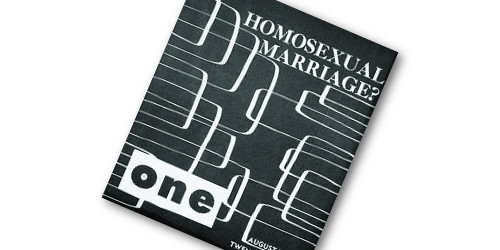
On Jan. 13, 1958, the U.S. Supreme Court delivered its first ever pro-gay ruling in ONE Inc. v. Olesen, a landmark decision that allowed a magazine for gays and lesbians to be sent through the U.S. mail.
ONE, Inc. was founded by four Los Angeles Mattachine Society members who set out to pioneer a strong nationwide voice for education and advocacy. According to ONE, Inc.'s articles of incorporation, "…the specific and primary purposes … are to publish and disseminate a magazine dealing primarily with homosexuality from the scientific, historical and critical point of view, and to aid in the social integration and rehabilitation of the sexual variant."
ONE debuted in January 1953, and quickly caught the attention gays and lesbians across the country. Circulation jumped to nearly 2,000 within a few months, with most subscribers paying extra to have their magazine delivered in an unmarked wrapper.
ONE's editorial tone was bold and unapologetic, covering politics, civil rights, legal issues, police harassment, employment and familial problems, and other social, philosophical, historical and psychological topics. Most importantly, ONE quickly became a voice for thousands of gays and lesbians across the U.S., many of whom wrote letters of deep gratitude to ONE's editors.
ONE magazine filled a void during a harsh time for LGBT people. President Dwight D. Eisenhower signed Executive Order 10450 in April of that year barring gays and lesbians from federal employment with its "sexual perversion" clause. This followed a highly-publicized purge of more than 400 gays and lesbians from the civil service some three years earlier. Homosexuality was criminalized in every state and stigmatized as a mental illness by the psychiatric profession. The FBI launched a vicious crackdown on homosexuality across the U.S., with many gays and lesbians losing their jobs for merely receiving homophile publications in the mail.
ONE immediately caught the eye of the FBI and they tried to shut it down. But when efforts failed to get the editors fired from their day jobs, the FBI decided to turn the job of shutting down ONE to the U.S. Post Office. In August 1953, postal authorities in Los Angeles held up that month's issue for three weeks while deciding if it violated federal laws. The cover story for that issue was on "homosexual marriage." Finally, officials in Washington decided the magazine didn't violate federal laws and ordered the L.A. Post Office to release it for shipment.
The next attack came from the Senate Foreign Relations Committee Chairman Alexander Wiley, (R-WI) who wrote a letter of "vigorous protest against the use of the United States mails to transmit a so-called 'magazine' devoted to the advancement of sexual perversions." Allowing a homosexual magazine to operate, he wrote, "(a) runs utterly contrary to every moral principle, (b) runs utterly contrary to our intentions to safeguard our nation's youngsters, (c) likewise, it is the very opposite of the entire purpose of our governmental security program…"
Soon thereafter the L.A. Post Office seized the October 1954 issue and charged the editors with violating the 1873 Comstock Act, which prohibited sending "obscene, lewd, and/or lascivious" material through the mail.
As chronicled in Courting Justice: Gay Men and Lesbians v. the Supreme Court, by Joyce Murdoch & Deb Price, ONE's attorney Eric Julber, a young straight lawyer fresh out of law school, took the case for free. He looked for help from the ACLU, but they wouldn't touch it. The ACLU was still defending anti-sodomy laws at the time. So it was up to young Julber to argue ONE's case in federal district court arguing that the magazine was educational and not pornographic. It didn't go well. The judge ruled for the Post Office in March 1956, and the 9th Circuit Court of Appeals agreed in February 1957, calling ONE "morally depraving and debasing" and saying that the magazine "has a primary purpose of exciting lust, lewd and lascivious thoughts and sensual desires in the minds of persons reading it."
ONE then took its case to the U.S. Supreme Court. To everyone's surprise, the Court agreed to take the case, its first ever dealing with homosexuality. Even more surprising, the Supreme Court issued its short, one-sentence decision on Jan. 13, 1958 without hearing oral arguments. That decision not only overturned the two lower courts, but the Court expanded the First Amendment's free speech and press freedoms by effectively limiting the power of the Comstock Act to interfere with the written word. As a result, lesbian and gay publications could be mailed without legal repercussions, though many continued to experience harassment from the Post Office and U.S. Customs.
True to its educational mission, ONE, Inc. founded the One Institute as an educational arm in 1956. In 1958, the ONE Institute Quarterly became the first academic journal on gay and lesbian studies in America. ONE magazine's last issue was in 1967. Today, the ONE National Gay and Lesbian Archives houses the world's largest research library on LGBT history near the main campus of the University of Southern California in Los Angeles.










